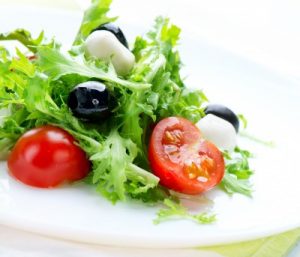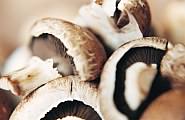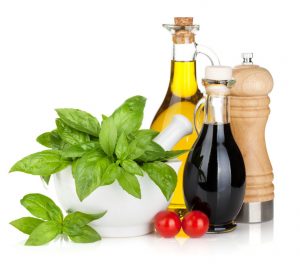
Ah, salad. Salads are a very important part of your daily diet.
Everyone knows how much I promote eating raw, and having a salad every day that’s filled with all kinds of goodies is an excellent way to have your daily raw servings.
Everything but the kitchen sink can be added to a salad. Try a wide variety of fruits and vegetables with every salad serving. And remember that salad vegetables should be stored in a dry, cold place – never wet.
Dry your salad veggies thoroughly before storing, otherwise water withdraws vitamins and minerals from the plants through osmosis.
Fresh Fruits, Berries, Nuts, and Veggies

Everyone requires several servings of fresh fruits, berries, nuts, and vegetables each day.
Ripe fruits contain needed enzymes, minerals from the soil, and vitamin A. Try to purchase fruits and vegetables grown in composted and natural soils.
And eat their seeds, too! Fruit seeds are rich in protein, polyunsaturated oils, vitamin A, B-Complex, large amounts of vitamin E, and B17.
The darker the fruit, the more roughage content and pro-vitamin A provided. A dark apricot has a far richer vitamin store than its pale counterpart, and remember, B17 concentrates within the inner seed of an apricot.
Agar-Agar
Have you heard of agar-agar? In the 1960’s and 1970’s, agar-agar was used quite a bit in food processing because it thickens and emulsifies better than any other food. Agar-agar can absorb up to 200 times its volume of water, making a form of jelly.
Agar-agar is popular among vegetarians because it is derived from a very special type of seaweed RICH in nutrients. Agar-agar is a cornucopia of ocean minerals, which nourish the thyroid gland, the pituitary and endocrine systems. Made of sea algae from the Orient, agar-agar is known in some parts of the world as Japanese Kanten.
Agar-agar keeps your bowel movements regular by swelling to many times its bulk when it reaches the intestines, increasing peristaltic action and elimination of waste.
Agar-agar has no calories, no carbs, no sugar, no fat and is loaded with fiber. It’s free from starch, soy, corn, gluten, yeast, wheat, milk, egg and preservatives. It absorbs glucose in the stomach, passing through the digestive system quickly, which inhibits your body from retaining and storing excess fat.

Foods To Add To Salads
The following is a list of foods that can be included to your salad, and some ingredients are rich in vitamins like B17*:
- watercress*
- spinach*
- bamboo sprouts*
- alfalfa sprouts*
- lentil sprouts*
- mung bean sprouts*
- garbanzo sprouts*
- red cabbage
- green cabbage
- red tip lettuce or your lettuce of choice
- peas
- carrots
- tomatoes
- radishes
- whole nuts*
- ground nuts*
- bell peppers
- onions
- scallions
- garlic
- marinated ”leftovers”
- chard
- dandelion greens
- water chestnuts
- shallots
- leeks
- oranges
- celery
- endive
- Chinese cabbage
- broccoli
- chives
- chilies
- asparagus
- cooked brown rice
- marinated garbanzo beans*
- coconut
- fish
- chicken
- lean roast beef and other lean meat
- lemon
- cauliflower
Salad Dressing

Salad dressing should be made fresh whenever possible; avoid bottled or packaged designs made with dry herbs.
Commercial salad dressings are typically filled with chemical preservatives and chemical flavor enhancers. If you don’t have time to make your own dressing or if you simply want a change, choose dressings with the fewest ingredients possible.
It’s always best to remember that the fewer ingredients in anything you buy that’s prepackaged, the more natural the product will be, and the healthier for disease recovery and long-term wellness.
What an excellent way to eat, manage your weight, and stay healthy.
________________
If you want to learn more about healthy eating, contact me at janethull.com. Remember that you are never alone when you are looking for good health!
Gain access to all of my online programs, ongoing support, monthly Q&A, and more by joining my Private Inner Circle Membership Program. I look forward to supporting you on your journey to alternative health and wellness.
_____________
Disclaimer: This article is for informational purposes only, and is educational in nature. The FDA may not have evaluated some of the statements. This article is not intended to diagnose, treat, cure, or prevent any disease. Please discuss with your own, qualified health care provider before adding supplements or making any changes to your dietary program.
Before taking vitamins, consult your doctor; pre-existing medical conditions or medications you are taking can affect how your body responds to multivitamins.
You have our permission to reprint this article if you attribute us with a live back-link to this article and the youtube links. https://janethull.com/